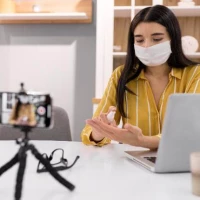
Phishing & Email Fraud
Get in touchAt Scam Claims, we help victims and across the UK who have been targeted by fraudsters posing as influencers, brands, or trusted online personalities.
Social media and influencer scams are a rapidly growing form of fraud, with criminals using fake accounts, deceptive promotions, and fraudulent collaborations to exploit users.
These scams cause not only financial loss but also risks to personal data and online security. Our solicitors provide specialist legal support to pursue compensation, challenge negligent institutions, and maximise the chances of recovering stolen funds.
Why Have Social Media & Influencer Scams Become a Growing Problem?
Social media and influencer scams occur when fraudsters impersonate well-known influencers, create fake brand partnerships, or promote bogus products and investment schemes.
Victims are typically approached through direct messages, fake adverts, or counterfeit profiles designed to look authentic. Scammers use urgency, exclusivity, or trust in familiar online figures to convince people to hand over money or sensitive information.
How Much Money Do Victims Typically Lose to Social Media & Influencer Fraud in or Around ?
Losses from social media and influencer scams range from £50–£200 for fake products or fraudulent “giveaways” to tens of thousands lost through bogus investments or romance scams.
National figures show that UK victims reported an average loss of £20,772 in social media–driven investment scams, while purchase scams average around £1,000 per incident. Romance scams remain especially costly, with typical losses of more than £11,000.
Which Types of Social Media & Influencer Scams Are Most Common Across ?
Fraud solicitors regularly deal with a wide range of social media and influencer scams, including:
Fake influencer profiles – Fraudsters impersonating well-known influencers to sell fake products.
Counterfeit brand collaborations – Criminals creating bogus “partnerships” to lure buyers or small businesses.
Phishing promotions – Fraudulent adverts or links designed to capture banking details.
Bogus giveaways – Scams asking users to share personal information or pay fees to claim prizes.
Cryptocurrency promotions – Fraudsters posing as influencers to push fake investment schemes.
Paid content scams – Victims tricked into paying for sponsored posts or collaborations that never materialise.
Untraceable payments – Scammers requesting money via bank transfer, gift cards, or cryptocurrency.
Can Victims Recover Funds Lost to Social Media & Influencer Scams?
Victims of social media and influencer scams may be able to recover money depending on the payment method and how quickly the fraud is reported.
Payments made by credit card or PayPal often provide additional protection, while certain bank transfers may be eligible for reimbursement under Authorised Push Payment (APP) fraud rules. Even when the fraudsters cannot be identified, legal claims and regulatory complaints against negligent financial institutions can improve the chances of recovering funds.
Contact Scam Claims to discuss your options for financial recovery.
How Do Lawyers Work With Banks and Regulators to Recover Funds?
Lawyers specialising in social media and influencer scams work closely with banks to trace fraudulent transactions, request freezes on accounts, and challenge refusals of reimbursement.
They also escalate complaints to the Financial Ombudsman Service and liaise with regulators such as the Payment Systems Regulator and Action Fraud. This collaborative approach strengthens victims’ claims and holds financial institutions accountable when they fail to protect customers.
Are No Win, No Fee Options Available for Social Media Scam Claims?
Our social media and influencer scam solicitors provide no-win, no-fee arrangements, allowing victims to pursue claims without upfront solicitor’s fees.
Fees are only payable if compensation is recovered, usually as a percentage of the recovered amount. This approach ensures victims can access professional legal support without additional financial strain.
What’s the Process for Bringing a Social Media & Influencer Scam Claim Forward in or Around ?
The process of a social media and influencer scam claim begins with an initial consultation, where victims share evidence such as messages, emails, payment receipts, or screenshots of fake profiles.
Solicitors then review the case, assess recovery options, and decide whether to pursue claims through banks, card providers, or civil courts. From there, they file claims, negotiate with institutions, and escalate matters to regulators if required. Victims are supported at every stage, with clear updates and guidance provided throughout.
What Legal Support Do Fraud Solicitors Provide for Social Media Scam Cases?
Fraud solicitors provide a full range of services for victims of social media and influencer scams, including:
Case assessment – Reviewing the details of the scam and identifying recovery options.
Evidence gathering – Collecting proof of fraudulent accounts, communications, and payments.
Claims against banks – Holding financial institutions accountable for negligence.
Regulatory complaints – Filing complaints with the Financial Ombudsman Service and other regulators.
Civil litigation – Pursuing direct legal action against fraudsters or associated companies.
Reporting support – Assisting victims in filing reports with Action Fraud and relevant authorities.
Do Solicitors Handle International Social Media Scam Cases?
Solicitors frequently handle international social media and influencer scam cases, as many fraudsters operate from overseas.
While tracing criminals abroad is complex, recovery efforts often focus on UK-based banks and payment processors that handled the fraudulent transactions. Where necessary, solicitors can liaise with foreign regulators and international financial institutions to strengthen victims’ claims and improve recovery chances.
Contact Scam Claims today to find out how we can support your case.
Get in touch
Skip to
Gallery



